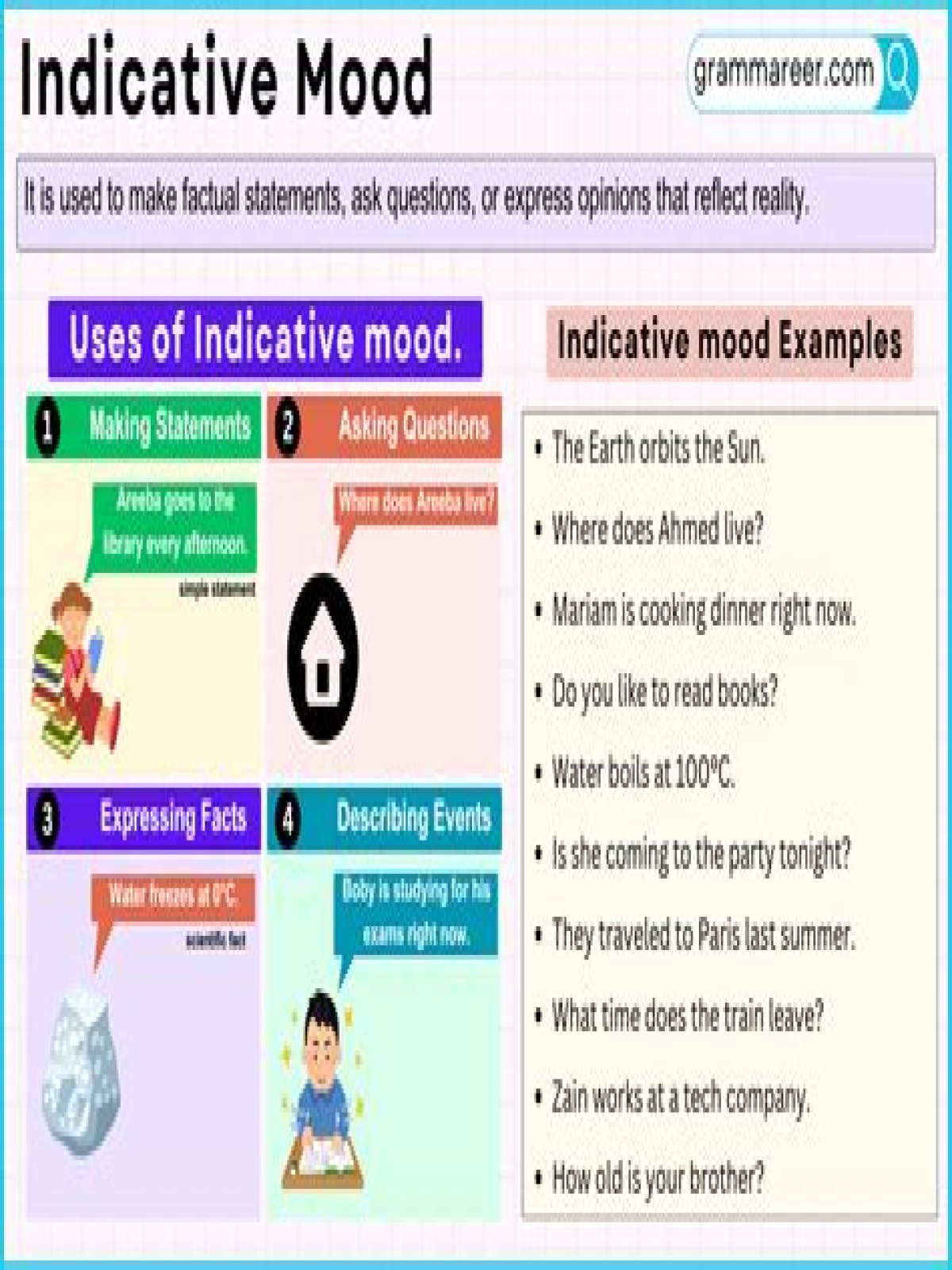Filters. Proclaimed; declared; public. adjective.
What is an example of indicative?
Indicative is defined as a grammar term for a verb or a sentence that either makes a statement or asks a question. An example of the indicative is the sentence, “The birds are singing.”
How is indicative used?
The indicative is used to talk about things that are objective and/or certain. This includes things like facts, descriptions, and scheduled events. The subjunctive is used to talk about things that are subjective and/or possible, but not certain.
What is the synonym of indicative?
In this page you can discover 29 synonyms, antonyms, idiomatic expressions, and related words for indicative, like: characteristic, exhibitive, expressive, representative, significatory, suggestive, significant, symbolic, subjunctive, imperative and denotative.
What is the difference between indicative and imperative?
The indicative mood is for stating facts, as in: “He is sleepy.” The imperative mood is for issuing commands, as in: “Go to sleep.” The subjunctive mood is for uncertainty, often expressing as a wish, desire, doubt or hope as in: “I wish I were sleepy.”
Is indicative a fact?
Kids Definition of indicative
2 : of or relating to the verb form that is used to state a fact that can be known or proved In “I am here,” the verb “am” is in the indicative mood.
How do you use the word indicative in a sentence?
Indicative in a Sentence The child’s anger problems were likely indicative of a deeper issue.The x-rays revealed injuries indicative of child abuse, showing unreported fractures throughout the body.They say that messy handwriting is indicative of a creative mind.
Is indicative a mood?
Teaches Writing. In grammar, the indicative mood is a verb mood that the speaker or writer uses to express information that sounds factual. Learn more about how indicative mood functions in a sentence.
What is the opposite of indicative?
Adjective. ▲ Opposite of revealing, indicating, or betraying something. uninformative. Adjective.
Is indicative a command?
The indicative mood makes a statement or asks a question. The imperative mood expresses commands or requests. The subjunctive mood represents an act or state of being as a contingency or possibility.
What’s the difference between subjunctive and indicative?
The main difference between indicative and subjunctive mood is that Indicative mood is used to state facts while subjunctive mood is to indicate imaginary or conditional situations.
What does conditional mood?
A conditional mood is the form of a verb which is used to make requests or expression of under what condition something would happen. It uses helping or auxiliary verbs such as, might, would, should and could.
What is the synonym of telling?
Some common synonyms of telling are cogent, convincing, sound, and valid. While all these words mean “having such force as to compel serious attention and usually acceptance,” telling stresses an immediate and crucial effect striking at the heart of a matter.
What is the synonym of juxtaposition?
Some common synonyms of juxtaposed are adjacent, adjoining, and contiguous. While all these words mean “being in close proximity,” juxtaposed means placed side by side especially so as to permit comparison and contrast.
What is an indicative verb mood?
1. Indicative Mood: This mood is used to express a fact statement. The verb in the indicative mood expresses an action as a statement of fact.
What is the difference between indicative and infinitive?
There are two verbs in the sentence, but both refer to the same person, they’ll both be indicative. In cases like these, you’ll use the indicative for the first verb and the infinitive (the purest form of the verb with a ‘to’ in front of it) for the second.
What is an indicative clause?
The indicative mood is used to make factual statements, ask questions, or express opinions as if they were facts. Any verb tense may be deployed in the indicative mood.
What does imperfect indicative mean?
The Imperfect Indicative is a past tense. It is used to talk about ongoing past actions, habitual actions in the past, and lasting personal qualities or conditions. It is used when talking about what time it was in the past, moods/feelings/and emotions in the past, someone’s age in the past, etc.
Recommended Posts
what is the meaning of dnv confira isto sigla dnv 2 quais sao os aspectos culturais do rio de janeiro confira isto aspectos culturais do rio de janeiro is it hard to learn unreal confira isto is unreal engine easy to learn quais foram as principais mudancas ocorridas no periodo classico confira isto quais foram as principais mudancas o que e planejamento dietetico confira isto planejamento dietetico 3 quem nao puxa saco puxa carroca significado confira isto quem nao puxa saco puxa carroca o que significa a palavra desabaladamente confira isto o que significa desabaladamente tem guaxinim no brasil confira isto guaxinim no brasil
